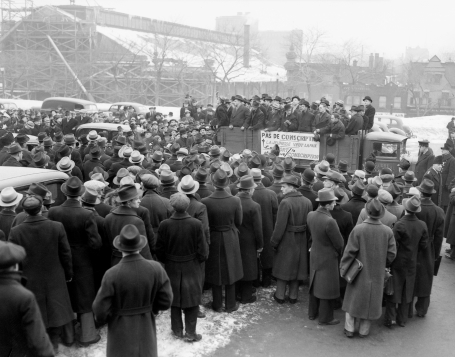
Nearly one hundred years ago today, on December 17, 1917, a federal election was held to elect members of the 13th parliament of Canada. The core issue in this election was conscription, and the result was a victory by clear majority for Sir Robert Borden’s Unionist government, which supported the policy. Later dubbed “the conscription election,” the 1917 election represented the climax of a crisis that divided the country for two decades and reemerged during the Second World War under Mackenzie King’s government.
In 1917, in an attempt to aid Britain’s war effort, the Borden government introduced conscription for military service overseas against the strong and clear objection from French Canada. It was a devastating blow to the national unity that Laurier and many other leaders had worked so strenuously to preserve, and left a legacy of mistrust and bitterness between the two Canadian peoples that remained throughout the interwar years. By the late 1930s, the word conscription became almost a taboo in Canadian politics. It was well understood by all major parties that to reintroduce compulsory military service overseas would be to commit political suicide, and conscription of any kind should be treated with extreme caution.
In 1939, all major political leaders were openly against conscription, but French Canadians still felt threated by the prospect of a repetition of the 1917 crisis. Responding to this public concern, King ensured the people that “so long as this government may be in power, no such measure [conscription] will be enacted.” In 1939-1940, opposition to conscription became a powerful tool almost overused by politicians in order to secure the support of the electorate, especially in Quebec. On the bright side, this intense repulsion against conscription helped the government maintain the necessary caution that would prevent the country from repeating the grave mistakes it made in the previous war.
Quebec’s opposition to conscription was especially deep-rooted. As another war became more and more likely in 1939, the bitter memory of the 1917 conscription crisis made many French Canadians fearful of another conscription forced on them by the federal government in an anxious urge to aid Britain. However, once the King government took a clear stance against compulsory military service overseas in 1939, French Canadians became much more supportive towards Canada’s war effort. When the National Resource Mobilization Act (NRMA) was introduced in 1940, French Canadians complied without major objection. French Canada showed its willingness to cooperate with the rest of the country in the war effort by both words and actions, and its cooperation was promptly recognized by both the federal government and English Canadians. Politicians and the public paid more attention to what French Canadians had to say, and treated them as a key component of Canada whose opinion truly mattered.
When the war situation changed fundamentally in 1940, the King government sought and succeeded in finding the perfect middle ground between conscription and public outcry for an increased war effort. Public opinion became more and more pro-conscription as the war became increasingly disastrous for the Allies over the course of 1940. By the time France fell in June 1940, conscription had clearly ceased to be a taboo. The National Resources Mobilization Act, introduced in June 1940, allowed the government to conscript all necessary resources including manpower for the purpose of Canadian home defense only. It enabled the King government to both respond to the demand of English Canada and to avoid breaking its promise of no conscription for overseas services. Although King would eventually break his promise in 1944 and send conscripts overseas, this time the issue did not shatter national unity nearly as much as it did during the previous war, as most people by that time had realized that there were very few alternatives left.
Conscription was one of the defining issues in Canadian political discourse during both world wars. Nearly a century has passed since the first conscription crisis threatened to tear the country apart, and the urgency of full-scale war seems far away today. But it is still worthwhile to look back at the conscription issue, as it represents one of the important periods in Canadian history when concerns for the well being of the Commonwealth had to be balanced against concerns for national unity.




